Related Research Articles

Vijayadashami also known as Dussehra, Dasara or Dashain, is a major Hindu festival celebrated at the end of Navaratri every year. It is observed on the tenth day in the Hindu calendar month of Ashvin, the seventh month of the Hindu Luni-Solar Calendar, which typically falls in the Gregorian months of September and October.

Abhimanyu is a warrior from the ancient Hindu epic Mahabharata. He was born to the third Pandava prince Arjuna and Yadava princess Subhadra, who was also Krishna's sister. He is believed to be an incarnation of Varchas, son of Chandra. Abhimanyu was raised by his maternal relatives as his father Arjuna, along with his 4 brothers and wife, was sent into Vanvas for 13 years. After his father's return Abhimanyu married Uttarā, the princess of Matsya. During the Kurukshetra War, Abhimanyu fought by his father's side. On the thirteenth day of the war, the mightiest Kaurava warriors came together and formed the Chakravyuha, the young Abhimanyu was able to penetrate it, but could never make his way out, and was slain inside it, fighting them all alone. His son, Parikshit, was the one who saved the lineage from extinction and went onto become a legendary king.

Virata, in the Hindu epic Mahabharata, was the king of Matsya Kingdom with its Virata Kingdom, in whose court the Pandavas spent a year in concealment during their exile. Virata was married to Queen Sudeshna and was the father of Prince Uttara and Princess Uttarā, who married Abhimanyu, the son of Arjuna. Abhimanyu and Uttara's son Parikshit succeeded Yudhishthira to the throne of Hastinapura, after the war of Mahabharata.

Kripa, also known as Kripacharya, is a figure in Hindu mythology. According to the epic Mahabharata, he was a council member of Kuru Kingdom and a teacher of the Pandava and Kaurava princes.

Virata was a kingdom ruled by the Matsya king by the name Virata. It was here that the Pandavas spent their 13th year of anonymity after their 12 years of forest-life in the forests of Kamyaka and Dwaita. It was also known as Virata Nagari, modern Bairat in the Jaipur district of Rajasthan. Akhnoor, a town in Jammu and Kashmir is also considered by some as the Virat Nagar. Upaplavya was another city in this kingdom where the Pandavas and their allies camped before the beginning of the great Kurukshetra War.

In the Hindu epic Mahabharata, Uttarā or Anglicized as Uttaraa (उत्तरा) was the daughter of Queen Sudeshna and King Virata, at whose court the Pandavas spent a year in concealment during their exile. She was sister of Uttar, Sveta and Shanka.
Mahabharat is an Indian Hindi-language epic television series based on the ancient Sanskrit epic of the same name. The original airing consisted of a total of ninety-four episodes and were broadcast from 2 October 1988 to 24 June 1990 on Doordarshan. It was produced by B. R. Chopra and directed by his son, Ravi Chopra. The music was composed by Raj Kamal. The script was written by Pandit Narendra Sharma and the Hindi/Urdu poet Rahi Masoom Raza, based on the original story by Vyasa. Costumes for the series were provided by Maganlal Dresswala. Basic source used was Mahabharata BORI Edition.

Nartanasala is a 1963 Indian Telugu-language Hindu mythological film directed by Kamalakara Kameswara Rao. The film was produced by an actress C. Lakshmi Rajyam and her husband C. Sridhar Rao under the Rajyam Pictures banner. It stars N. T. Rama Rao, Savitri, S. V. Ranga Rao, and Relangi while Mukkamala, Mikkilineni and Dandamudi Rajagopal play supporting roles among others. Susarla Dakshinamurthi composed the film's soundtrack and background score. M. A. Rahman and S. P. S. Veerappa served as the cinematographer and editor respectively. T. V. S. Sarma was the film's art director.
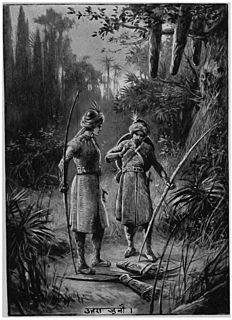
In the epic Mahabharata, Uttar was the prince of Matsya Kingdom and the eldest son of King Virata, at whose court the Pandavas spent one year in concealment during their exile. His sister Uttarā married Abhimanyu, son of Arjuna.

Virata Parva, also known as the “Book of Virata”, is the fourth of eighteen books of the Indian Epic Mahabharata. also Virata Parva traditionally has 4 sub-books and 72 chapters. The critical edition of Virata Parva has 4 sub-books and 67 chapters.
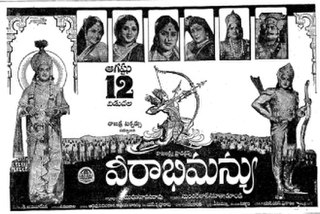
Veerabhimanyu is a 1965 Indian Telugu-language Hindu mythological film produced by Sunderlal Nahta and Doondi and directed by V. Madhusudhan Rao. It stars N. T. Rama Rao, Shobhan Babu and Kanchana, with music composed by K. V. Mahadevan. The film was recorded as a Super Hit at the box office. It was simultaneously filmed in Tamil as Veera Abhimanyu, with slightly different cast. The film had its climax scene shot in Eastmancolour.

Mahabharat is a 2013 Indian historical television series based on the Sanskrit epic Mahabharat. It aired from 16 September 2013 to 16 August 2014 on Star Plus. The television show was produced by Swastik Productions Pvt. Ltd.
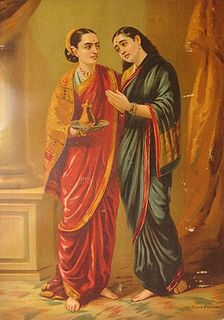
In the Hindu epic Mahabharata, Sudeshna was the wife of King Virata, at whose court the Pandavas spent a year in concealment during their exile. She was the mother of Uttar, Uttara, Shveta, and Shankha. She had a younger brother named Kichaka and a brother-in-law named Sahtanika.
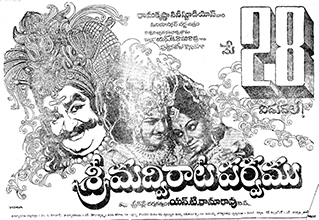
Sri Madvirata Parvam is a 1979 Telugu-language Hindu mythological film, produced and directed by N. T. Rama Rao under his Ramakrishna Cine Studios banner. It stars N. T. Rama Rao, Vanisri, Nandamuri Balakrishna and music composed by Susarla Dakshina Murthy. The film is based on Virata Parva from epic Mahabharata in which NTR has performed 5 pivotal roles, after blockbuster success of Daana Veera Soora Karna (1977), in which he emoted 3 different roles.

Suryaputra Karna is an Indian mythological epic television series, which premiered on 29 June 2015 on Sony Entertainment Television (India) and Sony Entertainment Television Asia. The show aired Monday through Friday nights at 8:30 PM. Produced by Siddharth Kumar Tewary of Swastik Pictures, the series covers the life journey of the greatest warrior of mahabharata daanveer Karna.The show starred Gautam Rode, Vishesh Bansal and Basant Bhatt as the lead character at various stages of his life.
Dakshayagam is a Kathakali play (Aattakatha) authored by Irayimman Thampi in Malayalam. Based on the Skanda Purana, it narrates the story of Daksha, son of Brahma, and his daughter Sathi. Sathi marries Shiva and after the marriage, an animosity develops between Daksha and Shiva. Sathi attends, uninvited, a yajna conducted by her father. Her father humiliates her and sends her away. Sathi returns to Shiva and asks him to kill her father to avenge the insult. Then she burns herself into ashes. Shiva creates two fierce warriors Veerabhadra and Bhadrakali, who behead Daksha and throw his head in the yajna fire. However, as an act of benevolence, Shiva brings Daksha back to life, albeit with a goat's head.
Keechakavadham is a Kathakali play(Aattakatha) authored by Irayimman Thampi in Malayalam. Based on the Mahabharatha, it narrates an episode from the thirteenth year of exile of the Pandava princes, during which they stay in disguise at the palace of the King of Virata. The Queen's brother, Keechaka, takes a liking to Panchali, who is working as the Queen's handmaiden, Sairandhri. Panchali tries to reject his advances but Keechaka presses on. This culminates in Bheema, in disguise as Valala, slaying Keechaka.
Bakavadham is a Kathakali play(Aattakatha) written by Kottayam Thampuran in Malayalam.Based on the Mahabharatha, the play narrates the events surrounding the escape of the Pandavas from the house of Lac which was built by the Kauravas as a trap. They escape to a forest where Bhima meets and marries Hidumbi. Following this, the Pandavas move to a village named Ekachakra, where they live in disguise. While in Ekachakra, Bhima slays Baka, a demon who has been terrorizing the countryside. The four plays of Kottayam Thampuran, namely, Kirmeeravadham, Bakavadham, Kalyanasaugandhikam and Kalakeyavadham, are considered very important in the Kathakali repertoire and are a combination of conventional structure('chitta') with intermittent possibilities for improvisation('manodharma').
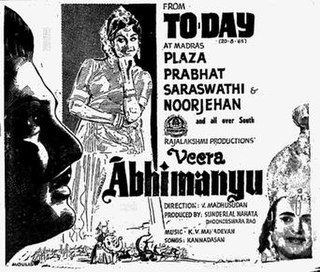
Veera Abhimanyu is a 1965 Indian Tamil-language Hindu mythological film directed by V. Madhusudhan Rao and produced by Sunderlal Nahta and Doondi. Based on Abhimanyu, a character from the Indian epic Mahabharata, the film stars Gemini Ganesan leading an ensemble cast, including A. V. M. Rajan portraying the title character. It was simultaneously filmed in Telugu as Veerabhimanyu, with a largely different cast. The film was released on 20 August 1965, and failed commercially.